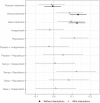Trade Wars and Election Interference
- PMID: 35729893
- PMCID: PMC9187851
- DOI: 10.1007/s11558-022-09464-2
Trade Wars and Election Interference
Abstract
In response to the Trump trade war, China, the EU, and other countries enacted politically-targeted trade retaliation (PTTR) against swing states and Republican strongholds in the United States. We argue that PTTR increases public concerns about foreign election interference and assess the effects of such retaliation across partisan affiliations. We test our predictions using a national survey experiment in the United States fielded before the 2020 election. In contrast to findings about sanctions and foreign endorsements, we find strong evidence that PTTR increases fears of election interference among both Republicans and Democrats. Partisan double standards in reaction to PTTR were strongest for retaliation targeting swing states and smaller for retaliation targeting the President's base. Overall, the evidence shows that economic policies which are not primarily intended to influence elections may nevertheless come to be viewed by the public as foreign election interference.
Supplementary information: The online version contains supplementary material available at 10.1007/s11558-022-09464-2.
Keywords: Election interference; Intervention; Retaliation; Tariffs; Trade war; public opinion.
© The Author(s) 2022.
Conflict of interest statement
Conflict of interest or competing interest statementThe authors are not aware of any conflicts of interest related to this research project. The research conducted here complies with the American Political Science Association’s Principles and Guidance for Human Subjects Research. The research was approved by the IRB at University of California, Berkeley under protocol 2019-07-12427.
Figures




References
-
- Albertson, B., & Gadarian, S. K. (2015). Anxious politics: Democratic citizenship in a threatening world. Cambridge University Press.
-
- Alexseev MA, Hale HE. Crimea come what may: Do economic sanctions backfire politically? Journal of Peace Research. 2020;57:344–359. doi: 10.1177/0022343319866879. - DOI
-
- Aronow, P. M., Kalla, J., Orr, L., & Ternovski, J. (2020). Evidence of rising rates of inattentiveness on lucid in 2020. SocArXiv
-
- Baum MA, Potter PB. The relationships between mass media, public opinion, and foreign policy: Toward a theoretical synthesis. Annu. Rev. Polit. Sci. 2008;11:39–65. doi: 10.1146/annurev.polisci.11.060406.214132. - DOI
-
- BBC. (2018). US tariffs: Allies retaliate with levies on jam, lamps and sleeping bags. Technical Report BBC.
LinkOut - more resources
Full Text Sources
